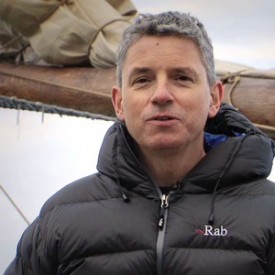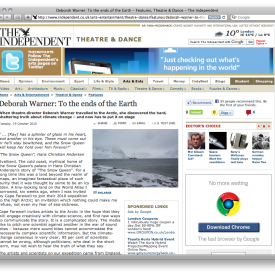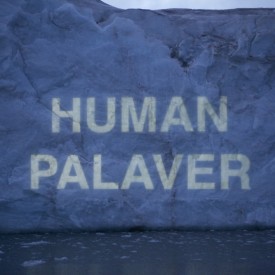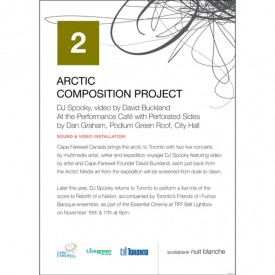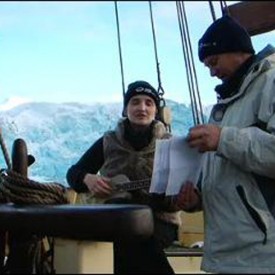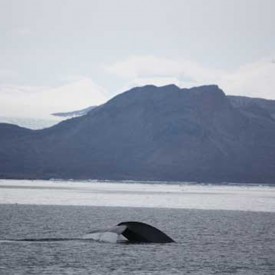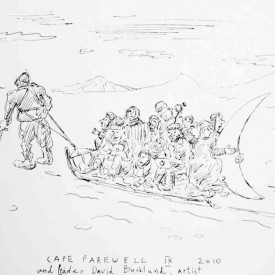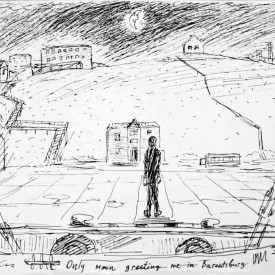Finding the words to describe the Cape Farewell experience is a full-time job. We are sailing through a land of ice, glaciers, and waters in which evocative words like kittiwakes and minke feature prominently. Several languages are spoken at any given time—from the Latin names that describe the birds and microscopic organisms, to the mother tongues native to the five Russians, two Germans, four Dutch crew and English spoken with accents from Spanish, Genevan-tinted American, Canadian, Australian. English—and the variants below—are the common currency within this rich tapestry of language. Between the lines, you’ll find a random sampling of the things Cape Farewellians are struggling to describe.
Some of the words apply to the work of the artists onboard as they ask unusual things of our crew to execute their work. For example:
Lunar Landing:
The tender placement of Russian artist Leonid Tishkov’s moon throughout the Arctic landscape.
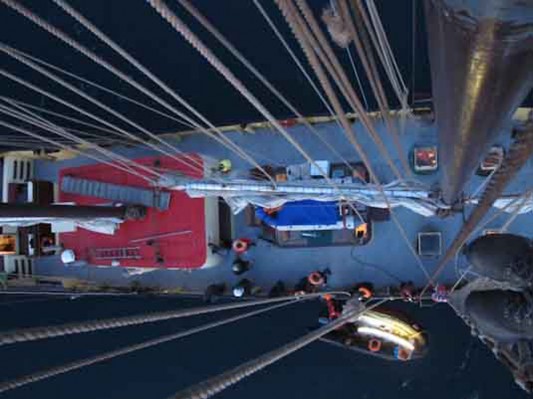
Artist Iris Haeussler is a German-Canadian whose work tends to involve slipping into someone else’s character to create highly literary sculptural installations. Her words are a particularly rich source of found meaning.
Seducting:
The feeling of putting one’s arm into the birth canal of a glacier.
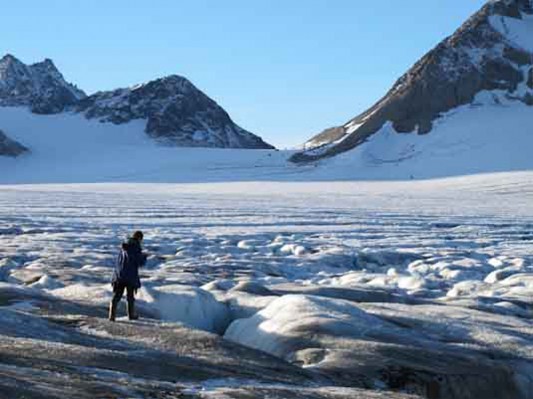
Sheeping fleas:
Trying to organize artists into group behaviour, similar to the English herding cats. As in, Our guide Andre’s job is like sheeping fleas.
Our guide Andre’s Russianesque word collages, or Andreisms, ring with truth and creativity. A favourite was an unpronounceable and unwritable Russian word that translates into “Continent Which Disappears,” referring to a continent one explorer thought was there but couldn’t find. Obviously, there is no English equivalent. Through Andre we were also introduced to the heroic stories of the Pomors, the slightly mad Russians whose explorations into the Arctic are legend. The ship has also come to understand the word Pomor as a general proof that it’s possible for humans to survive for at least six years and three months with less than no supplies. Here are a few more examples:
Picturing:
We have adopted Andre’s usage of picture as a verb, as in, “This is a good place for picturing,” as we chance upon a walrus graveyard or a particularly beautiful melting glacier.
Dangery:
A sort of diminutive form of danger, smaller and cuter than real danger.
Andreus arcticus parasiticus:
A new species conjured up by Russian playwright Misha, based on the misunderstanding that scientist Debora Inglesia-Morales’ research had found a new species of phytoplankton (variant from the original self-named Andreus Arcticus).
The Stick of Memory and other technical terms:
The florid poetics of Deborah Warner’s linguistic inversions include several terms coined to describe the ubiquitous technology that fills the warm parts of our waking hours. Thanks to Deborah, data is often transferred via a “stick of memory,” and she can often be found “loading down” images on to her laptop. A perfectionist who is assiduously writing a blog despite loathing both the word and the literary form, she coined the term “Overshot Myself” upon finishing her first entry.
Poet and screenwriter Nick Drake (not the dead musician) can always be counted on for a great description, like glaciers being “a 12,000-year-old library of time.”
Nick, who like me is of partial Eastern European heritage is particularly fond of one of the few Czech phrases I can remember, “Spratek alle teplocka, which means, “Shitty but fine,” and can refer to a whole range of things, from, How’s your blogging coming along, to what’s the weather like on deck.
Other useful terms for common ship behaviours and phenomenon:
Reindeer Time
A pet term for a nap or quiet time (inspired by the unique survival adaptation of the Svalbard reindeers to lead a life that is as sedentary as possible to avoid stress and conserve energy).
Polar Bearings
Refers to using magnetic north rather than the degrees of longitude and latitude to navigate (inspired by Simon Boxall’s description of the scientific Babel that results when the land scientists collect data using the former measure, and the ocean scientists the latter).
Ubersprungshandlung:
Literally, over-leap-action. A type of procrastination or evasion whereby one jumps over the reality of what needs to be done to do some random and irrelevant action.
Iris introduced this word into English, and it seems to encapsulate our response to the big picture of climate change, the grave failure of the human species to respond to the reality of the problem under our nose. The retreat into the everyday is a very human response, and yet the stark reality of the science as presented by Dr. Simon Boxall—the inexorable rise in carbon dioxide levels and the rising fever of the earth, the melting of the ice at the north pole will have on ocean currents and global climate effects the accelerated melting of the ice far ahead of the predictive models, the rising water levels—this conflated future is the stuff over which we are leaping. Trying to find The Word that might do justice to its enormity.
BACK TO TOP